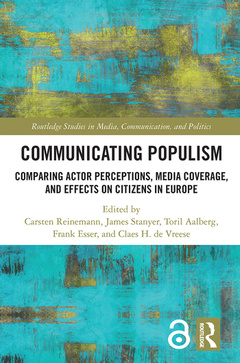Description
Communicating Populism
Comparing Actor Perceptions, Media Coverage, and Effects on Citizens in Europe
Routledge Studies in Media, Communication, and Politics Series
Coordinators: Reinemann Carsten, Stanyer James, Aalberg Toril, Esser Frank, de Vreese Claes H.
Language: English
Subjects for Communicating Populism:
Keywords
OLS Regression; NATO Relation; media and politics; Immigration News Coverage; communication and politics; EU Turkey Deal; European politics; Quality News Outlets; political communication research; OLS Regression Analysis; populism; EU Affair; comparative communication studies; News Cues; empirical research; Populist Political Communication; journalism; De Vreese; COST; Populist Messages; European Cooperation in the field of Scientific and Technical Research; Survey Layout; European media; Populist Political Actors; international media; Blame Perceptions; Blame Attributions; Qualitative Comparative Analyses; Populist Communication; Populist Political Parties; Immigration News; EU Citizen; News Logic; Editorial Mission; Populist Attitudes; Voting Intentions; Populist Parties
Publication date: 12-2020
· 15.2x22.9 cm · Paperback
Publication date: 03-2019
· 15.2x22.9 cm · Hardback
Description
/li>Contents
/li>Readership
/li>Biography
/li>
The studies in this volume conceptualize populism as a type of political communication and investigate it comparatively, focusing on (a) politicians? and journalists? perceptions, (b) media coverage, and (c) effects on citizens.
This book presents findings from several large-scale internationally comparative empirical studies, funded by the European Cooperation in the field of Scientific and Technical Research (COST), focusing on communication and the media within the context of populism and populist political communication in Europe. The studies are based on comparative interview studies with journalists and politicians, a large-scale comparative content analysis, and a comparative cross-country experiment using nationally representative online-surveys over 15 countries. The book also includes advice for stakeholders like politicians, the media, and citizens about how to deal with the challenge of populist political communication.
This enlightening volume is ?populist? in the best sense and will be an essential text for any scholar in political science, communication science, media studies, sociology and philosophy with an interest in populism and political communication. It does not assume specialist knowledge and will remain accessible and engaging to students, practitioners and policymakers.
Chapter 1 and 11 of this book are freely available as a downloadable Open Access PDF under a Creative Commons Attribution-Non Commercial-No Derivatives 3.0 license. https://tandfbis.s3-us-west-2.amazonaws.com/rt-files/docs/Open+Access+Chapters/9781138392724_oachapter1.pdf
https://tandfbis.s3-us-west-2.amazonaws.com/rt-files/docs/Open+Access+Chapters/9781138392724_oachapter12.pdf
Chapter 1: Introduction: Comprehending and investigating populist communication from a comparative perspective PART IPopulism and CommunicatorsChapter 2: Perceptions of Populism and the Media: A Qualitative Comparative Approach to Studying the Views of Journalists and Politicians Chapter 3: Journalists’ Perceptions of Populism and the Media: A Cross-National Study Based on Semi-Structured Interviews Chapter 4: Politicians’ Perceptions of Populism and the Media: A Cross-National Study Based on Semi-Structured Interviews PART II
Populism in the Media Chapter 5: Dimensions, Speakers, and Targets: Basic Patterns in European Media Reporting on Populism Chapter 6: Journalistic Culture, Editorial Mission, and News Logic: Explaining the Factors Behind the Use of Populism in European Media Chapter 7: Event-, Politics-, and Audience-Driven News: A Two-Year Comparison of Populism in European Media Coverage PART III
Populism and Citizens Chapter 8: The Persuasiveness of Populist Communication: Conceptualizing the Effects and Political Consequences of Populist Communication from a Social Identity PerspectiveChapter 9: Investigating the Effects of Populist Communication. Design and Measurement of the Comparative Experimental Study Chapter 10: Cognitive Responses to Populist Communication: The Impact of Populist
Message Elements on Blame Attribution and Stereotyping Chapter 11: Attitudinal and Behavioral Responses to Populist Communication: The Impact of Populist Message Elements on Populist Attitudes and Voting Intentions PART IV Conclusion Chapter 12: Adapting to the Different Shades of Populism. Key Findings and Implications for Media, Citizens, and Politics
Carsten Reinemann is a professor of political communication and head of the Department of Media and Communication at Ludwig-Maximilians-University Munich, Germany. His research interests include populism, extremism, political journalism, and media effects.
James Stanyer is a professor of communication and media analysis, School of Social Sciences, Loughborough University, UK. His work has appeared in a wide range of academic journals, and he is the author of Intimate Politics (2013), Modern Political Communication (2007), and The Creation of Political News (2001).
Toril Aalberg is a professor and head of the department of sociology and political science at NTNU in Trondheim, Norway. Her research interests include comparative politics, election campaigns, how media affects public opinion, the relationship between media and politics, and the role of stereotypes.
Frank Esser is a professor of international and comparative media research at the University of Zurich. His research focuses on cross-national studies of news journalism and political communication.
Claes H. de Vreese is a professor and chair of political communication at the Amsterdam School of Communication Research (ASCoR), University of Amsterdam. His research focuses on political journalism, populism, news media effects, and public opinion.




